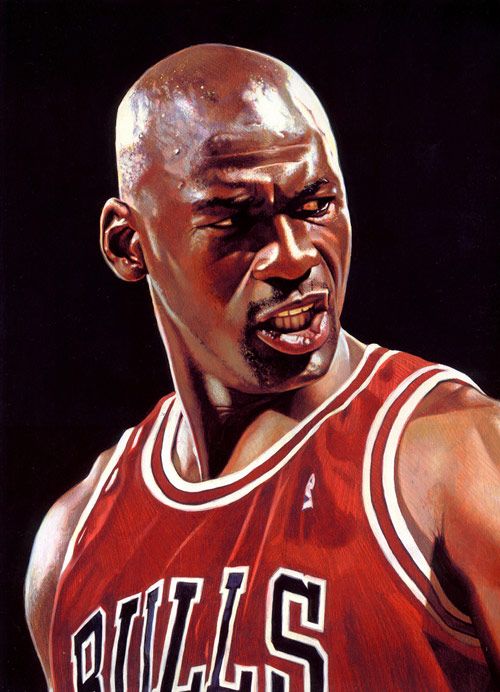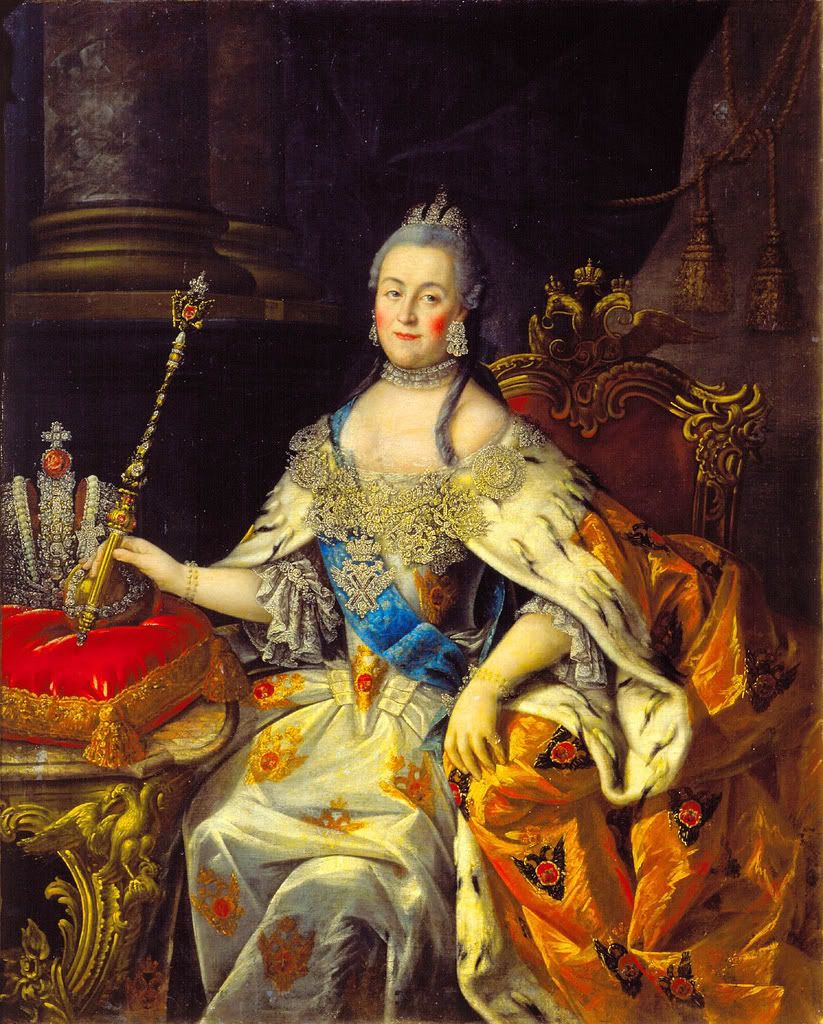 Michael Jordan is universally revered as a great basketball player (even by Jazz fans), but he has, as of late, come under scrutiny for his non-basketball personality. He's said to be a nearly intolerably competitive guy (rumor has it after a teammate blew a game, Jordan snatched the man's plate away during a team dinner and said something to the effect of "Only good players get to eat"). This competitive behavior that drove Jordan to a place of Mellevillean obsession and psychosis was on full display during his hall of fame inductee speech. He jokingly, in jokes that weren't funny because they were barely veiled aggressive challenges, thanked those who had cut him from teams, underestimated him, or made the mistake of thinking they could guard him. After this speech everyone turned on their inner psychoanalyst abilities and declared that they had discovered the secret to Jordan's success. The cause of his obviously great talent was declared to be his competitiveness. It drove him to be great, but it also obviously made him an egotistical mess. A man who would never be happy. This was a great story because it had the full heft of a Shakespearean tragedy. It also had the unstated assumption that greatness might not be worth it. The rest of us didn't have to feel as bad that we weren't Jordan because, when you really saw what it was like to be the man, would you really want to?
Michael Jordan is universally revered as a great basketball player (even by Jazz fans), but he has, as of late, come under scrutiny for his non-basketball personality. He's said to be a nearly intolerably competitive guy (rumor has it after a teammate blew a game, Jordan snatched the man's plate away during a team dinner and said something to the effect of "Only good players get to eat"). This competitive behavior that drove Jordan to a place of Mellevillean obsession and psychosis was on full display during his hall of fame inductee speech. He jokingly, in jokes that weren't funny because they were barely veiled aggressive challenges, thanked those who had cut him from teams, underestimated him, or made the mistake of thinking they could guard him. After this speech everyone turned on their inner psychoanalyst abilities and declared that they had discovered the secret to Jordan's success. The cause of his obviously great talent was declared to be his competitiveness. It drove him to be great, but it also obviously made him an egotistical mess. A man who would never be happy. This was a great story because it had the full heft of a Shakespearean tragedy. It also had the unstated assumption that greatness might not be worth it. The rest of us didn't have to feel as bad that we weren't Jordan because, when you really saw what it was like to be the man, would you really want to?
This is all a pretty good analysis, as far as it goes, but it doesn't really capture the truth. Simply put, a lot of guys are really competitive pricks. And a lot of them have insane basketball talent. The best example of one of these is Kobe Bryant, who yesterday, called a ref a gay slur that refers to the pile of sticks used to burn gay people in the past. Kobe was visibly upset after getting a technical foul called on him. He stormed to the bench, nearly punched his teammate, threw a towel, and then yelled out to the ref. Basically he threw a nationally televised fit. Here's some video. Today he gave a milquetoast apology saying what he said wasn't meant to be taken literally (the guy isn't literally a pile of sticks, I guess) and that he didn't mean to offend anyone. Some (my good friend representing them) think this is just the kind of thing that Michael Jordan would do if he were around today. They argue that basketball players, or at least the hyper competitive kind, are small minded, quick to fly off the handle, and can get pretty offensive and pretty scary quite rapidly. If we have no examples from Jordan's actual career of incidents like this one it is because the media have advanced to such a point that everything is now covered. There is some truth in the idea that today's players face increased media scrutiny. Still, we have a love of heroes. LeBron was one up until the decision, where most of the criticism coming at him was pretty lame and was squashed by people in the media themselves. LeBron, up until the decision, had something else in common with Jordan too. Something that Kobe lacks: he was a deft handler of his image.

I think the forgotten piece in the Jordan puzzle (or a forgotten piece, as we'll never fully recreate the man) was his ability to handle his image; to make his own story into something that we would root for above and beyond the game. He has oft been mocked for saying that he wouldn't endorse a Democratic candidate because "Republicans buy shoes too," but this mockery totally misses the point of the man and his comment. All great men and women, from Catherine the Great and Napoleon Bonaparte to Teddy Roosevelt to Mahatma Gandhi knew how to spin their own legacy. They were, each one of them, shameless self promoters. They also knew, almost instinctively how to blend their stories into larger themes and how to rewrite their pasts so that they fit the day's narrative and appealed to a broad spectrum of people. A huge part of Napoleon's legacy comes from his memoirs, written when he was imprisoned, which reinterpret his rule through the prism of pro-republicanism and freedom loving grandness. I believe that all the great persons of history have either done this, or had it done for them by those who followed (which may be the case with Leonardo Da Vinci and William Shakespeare). How else could their trials and tribulations remain timeless, if they didn't change to speak to each time that considered them?
Michael Jordan did the same, albeit on a much smaller scale. In his youth he was the hotshot scorer. The dunker and leaper with unparalleled athletic ability.
Then he was the hero valiantly fighting a losing battle against superior teams from Detroit and Boston (it was a sole man vs. the hordes, the same concept as 300).
Then his story changed again, he became on top of the world, the best ever. He dunked less, but he was just as murderous for his passing and shooting abilities.
Then he was too good for basketball even. Then he returned, world weary, like the man going in for just one last heist. He was still on top of the world, but he dominated through sheer will power instead of talent. He relied more on teammates and played defense to win.
Of course each of these transitions was punctuated with the appropriate spin and commercials. Jordan launched Space Jam at the height of his (nearly) final career stage (then he came back for the Wizards, spinning himself both as the returned hero and now wise master).
The thing is, none of these stages of Jordan are really discrete. He could dunk against the Jazz and he could shoot, pass, and play D back in his North Carolina days. He chose to emphasize different aspects of his game and hinted to the media what needed emphasis so as to fit his personal narrative into what was big at the time. The media shaped a lot of this on its own, but Jordan was smart enough to take their cues and play along. His ability to appeal to so many different people in so many different ways made him a wonderful basketball player, but also a great man. I'm still in awe that I lived during his time and got to witness his legend unfold first hand.
Every great person has the talent and skills that inflame our imaginations, that lead us to speculate about them and even worship them. What separates the great from the merely talented is the ability to shift their personal stories into the realm of the mythic. Michael Jordan would have never thrown a fit like Kobe, not because he wasn't as big of an asshole, but because that would have marred the Michael Jordan legend. He craved not only Ws but a legacy as well; his ambition was big enough that it contained his name in the history books, not merely a list of the number of rings he won. He is still working on it, still trying to prove himself great, this time as the builder and runner of a basketball team. The kind of largeness that Jordan sought is so big that Kobe has no clue it exists. He stands next to it in all his petty smallness, not knowing the chill he feels is from a colossus' shadow blocking out the sun. As he enters into the playoffs, obsessed with tying Jordan's ring record and putting his name in the conversation for best basketball player ever to live, he is completely unaware that he has already lost.


No comments:
Post a Comment